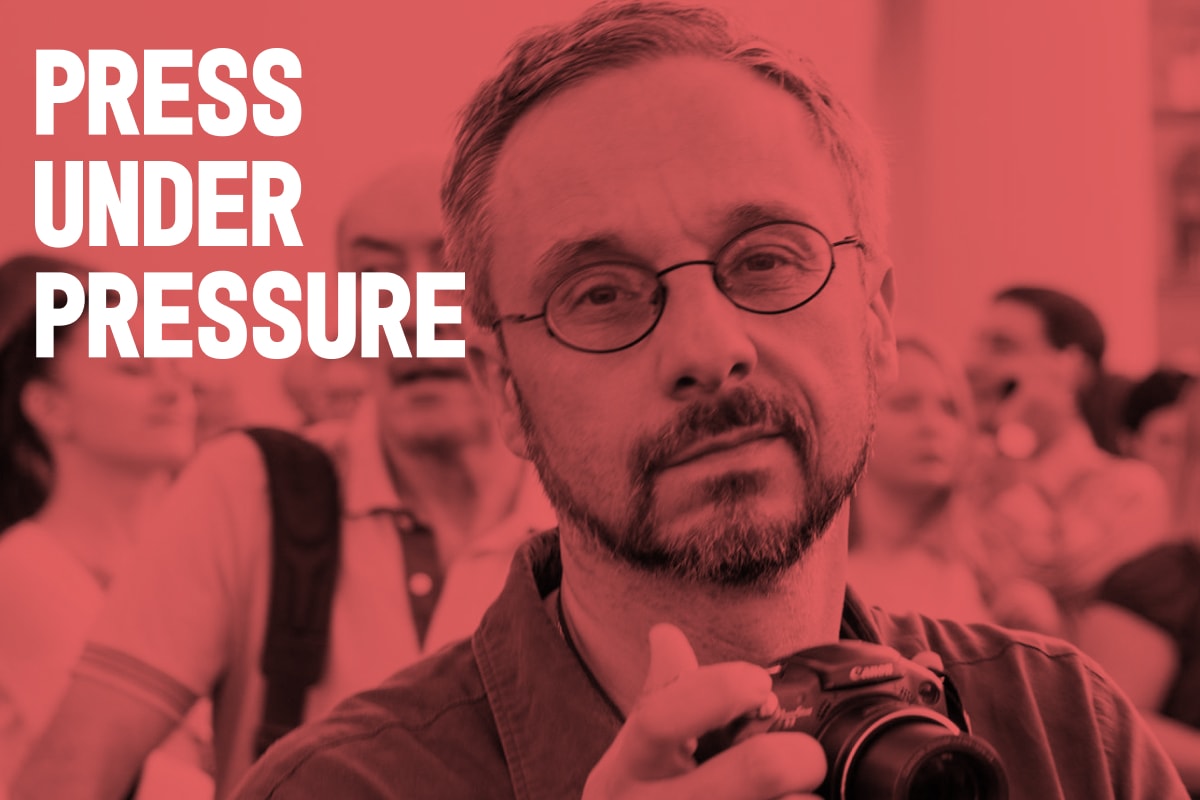
Articles he is accused upon have been changed several times. Dzmitry was charged with creating an extremist group and tax evasion. He has been recognized as a political prisoner.
On 6 June 2022, closed court proceedings started on the BelaPAN case which involved Dzmitry Navazhilau. On October 6, 2022 at Minsk regional court a sentence was given on that case. Navazhilau was sentenced to 6 years of reinforced regime colony. Besides, he was accused of income tax evasion from February, 2015 to April, 2021. The political prisoner must pay fine at the amount of 22,400 BYN (about 8,800 USD).
On January 20, 2023, the Ministry of Internal Affairs added Navazhilau to the list of persons involved in extremist activities.
The journalist’s story is told by his colleagues.

I met Dzima [short for Dzmitry] when he worked as head of the ORT, then First Channel, news office. He started as a TV journalist and interviewed me as a political analyst. He was very professional, asked on-point questions.
Dzima came to TV journalism when Russia still looked democratic. Many Belarusian opposition actors considered it an example. Those were Eltsyn’s times, the 1990s. I think Dzima as a person has formed during those times; his youth coincided with perestroika, the first years of independence of Belarus and Russia when the atmosphere was completely different. The perestroika romance, that of democratic changes led him to journalism.
With time, I started to see Dzima felt uncomfortable as a representative of a TV channel from Moscow. This could likely be a reason for him to leave.
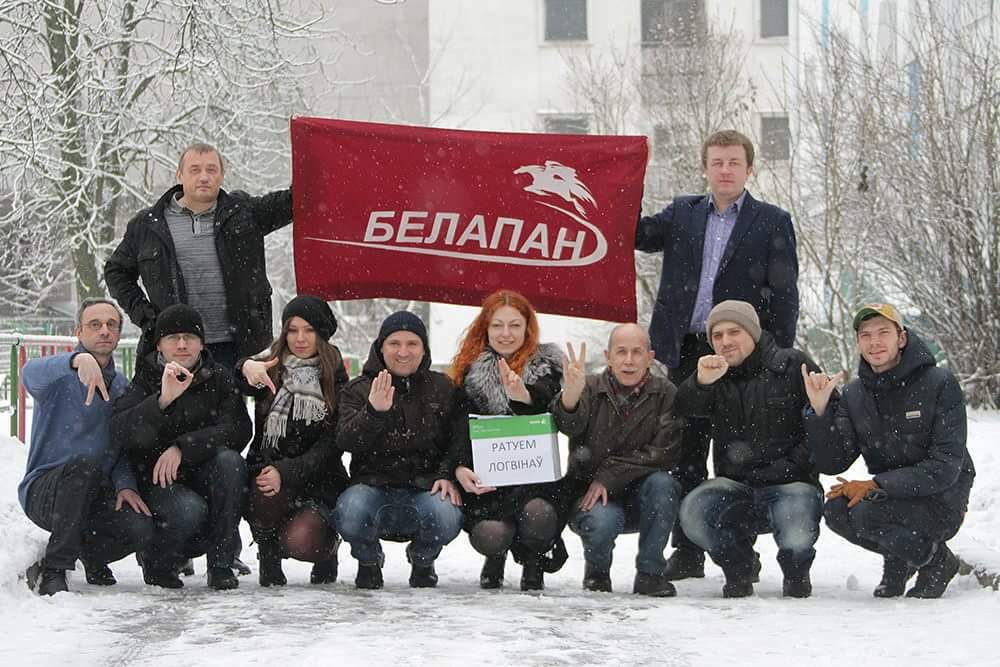
After Ales died, Navazhilau became the leader, Director of BelaPAN. It wasn’t an easy mission. Ales had influence; he had run the information company for many years, it was hard to replace him.
But Navazhilau was absolutely right, I think, to rely on team work, on trusting his employees. I used to write and edit analytical materials by myself and Navazhilau would never stand behind my shoulder demanding, ‘Show me your material, I’ll make sure you wrote everything right.’
I used to create an article and post it on the BelaPAN website by myself. Dzima could suggest a topic, give advice, but never acted authoritatively or intervene with the employees’ creative freedom. I think not only I, but other employees felt this polite style of management as well.
If I had to describe Dzima as a person and a manager with one word, it would be sensitivity. It’s a comprehensive term embracing correct manners and punctuality, methodology and a balanced approach to any issue.
I don’t remember him raising his voice at anyone. He tried to resolve problems at BelaPAN in a very mild, polite manner. There were problems, of course, both in the creative area and between employees. Dzima could be persuasive and firm at times, but he never shouted; he simply gave a rational justification of why things should be done this or that way.
Another word about Dzima would probably be propriety. It’s a component of his sensitivity, which is extraordinary in our times, I’d say, because many show off by using one or more obscene words. It’s completely unnatural for him.
Plus his specific sense of humour when he says something ironic with a serious face. People who don’t know him often believe it while he is actually being ironic. This makes him unique and I think he remains just as ironic in his current very complicated circumstances.
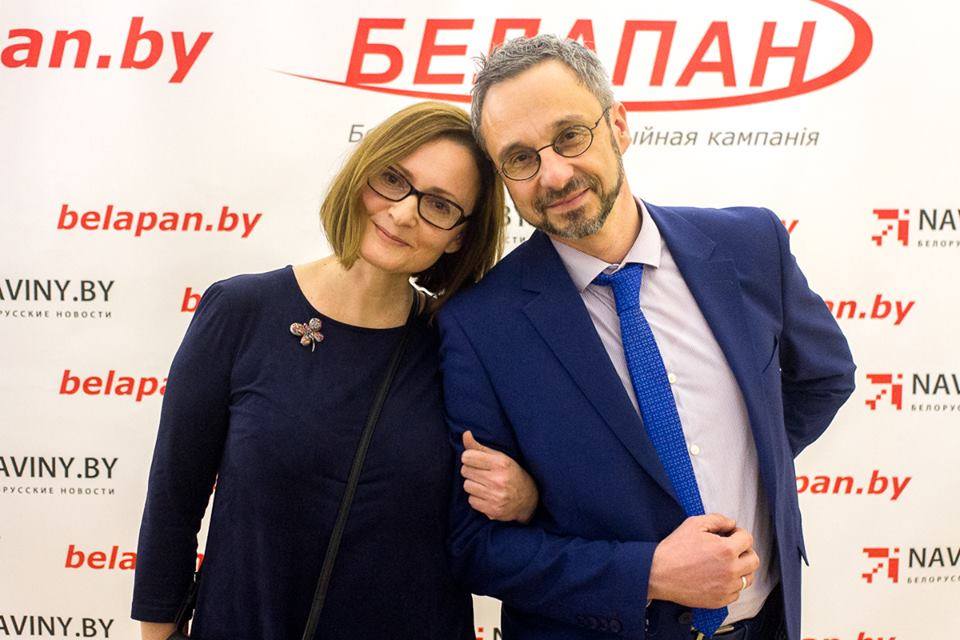
Dzima’s story is one of the many dramatic stories of Belarusian journalists. It should be considered within the course of the Belarusian authorities to destroy independent media. The Belarusian regime has never favoured the independent media and after the events of 2020 a decision was made to shoot to kill, so to speak.
The authorities try to control everything, they think media are the speakers of the regime, of those running the country. They have no idea about the independent press. And once the authorities see a threat they act immediately and ruthlessly. So they started to scorch the media field which also affected BelaPAN.

We met before Navazhylau came to work at BelaPAN, when he still worked at ORT. We just met at some events, had some talks, small talks during breaks and while waiting. Dzima has always made an impression of a smart, sensitive, very kind, very well-mannered man who was interesting to talk to.
Dzima is very thorough, he has always been diligent about his work, did his best to deliver. He has always been very responsive to any requests.
I remember when contact groups on Ukraine started [contact groups on peaceful resolution of the situation in the Eastern Ukraine], the venue was not properly organised for journalists. So we, journalists, often had to stay outside when these events took place at the residence in the Voiskovoi lane. It was freezing, unfriendly, snowing. I wrote, ‘We’re outside, freezing’ in the editorial office chat. Dzima was at work and he came to us in his own car, parked as close to the venue as he could and said, ‘Let’s go get warm in the car, one by one.’ I think it characterises him as a person very well: he is always willing to help anyone in trouble.
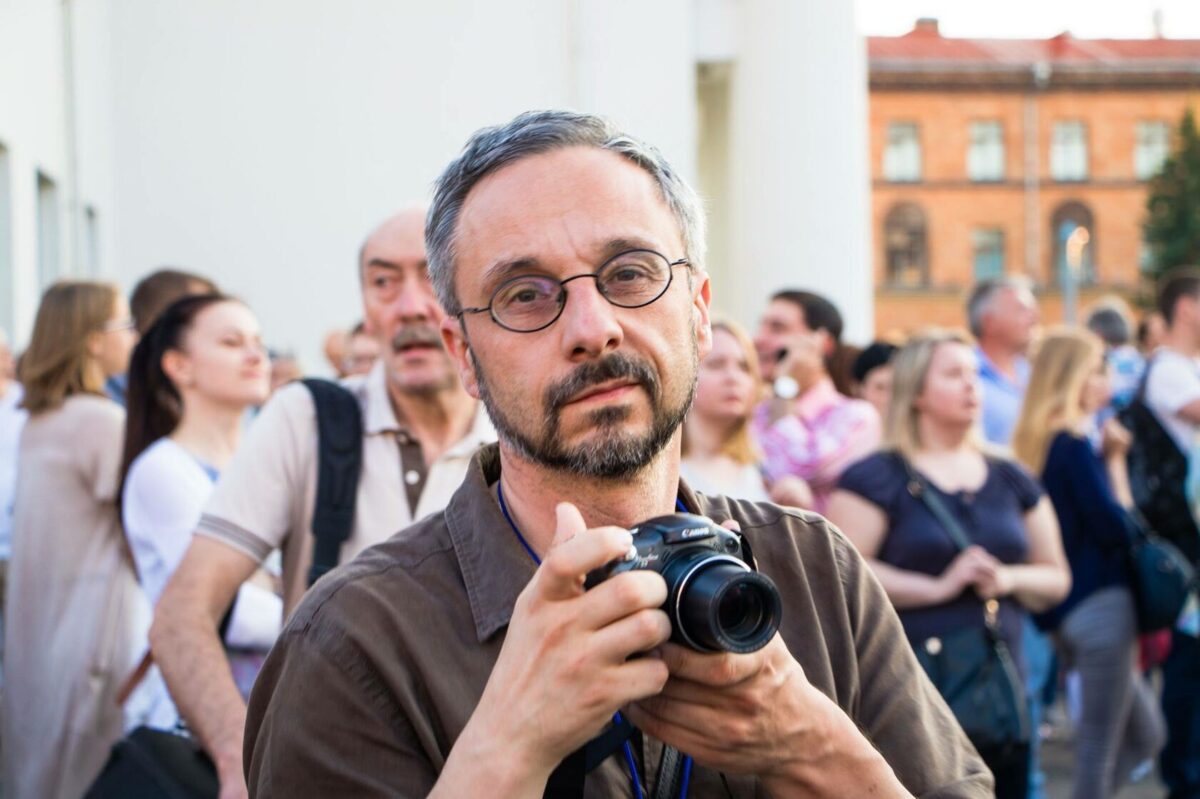
All ‘cases’ against independent editions and journalists are aimed at suppressing the independent press, to silence the journalists, prevent them from doing their jobs and give objective information about what’s happening in Belarus. All actions of the authorities in the past two years have been directed at that.
Political prisoners, both journalists and others, are imprisoned on no legitimate grounds, falsely and absurdly accused.
I regularly send letters and post cards to Dzima and Ira (Iryna Leushina) and Andrey (Andrei Aliaksandrau). I haven’t received any responses which made me come to a conclusion that they don’t receive my letters or they do but their responses get intercepted. I think the latter is unlikely though. Letters ‘from outside’ are intercepted in order to keep people isolated from information—a way to torture the imprisoned: they are cut off of the information and have no idea about what is happening. It is tormenting. It feels like there is no support left, like everyone forgot about you.
Many political prisoners don’t receive letters, not only our people. It is a deliberate policy to torture people: not only are they imprisoned and held in terrible conditions, they are also deprived of the possibility to communicate with their families and friends.

Dzima and I have known each other for a quarter of a century. On nodding terms at first and then Davis Cup Belarus was held at Minsk tennis courts in April 2001. He came there and brought his whole family including Dyadya Fyodor—the nickname I gave to his then four-year-old son. It was a long game and we had plenty of time to talk.
I won’t remember what we talked about but if you asked Dzima, he would tell you every detail. His memory of events is phenomenal. Ask him where we met. I can’t recall and he would probably tell the exact date and time.
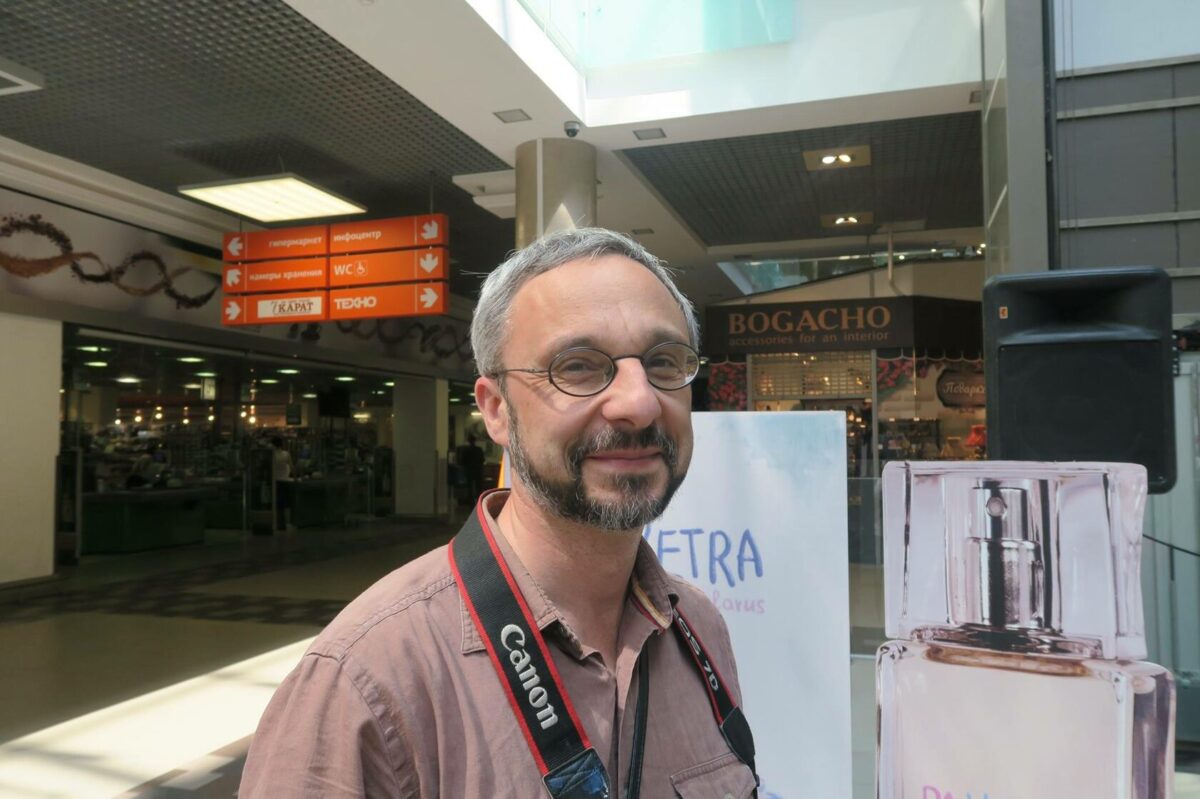
Whatever happens he never loses it, he keeps everything inside. He always wins you over with his calmness. I think this quality of his helped the whole BelaPAN to get around Ales Lipai’s death less painfully in 2018. It’s not Navazhilau’s style to sit on his hands and complain.
He has a talent to build relationships with people. One’s personal qualities are more important to him than the formal party they belong to.
We never talked about work much. Each of us knew their part. While we could spend hours talking about football with a cup of freshly brewed coffee. Dzima is a devoted fan of the Liverpool club. It’s not my club but I greatly respect its coach, Jürgen Klopp. And clearly, we don’t only talk about Liverpool and Klopp.

Dzmitry Navazhylau and Andrei Aliaksandrau
I’ve heard Dzima is a believer. But he never expressed it at work, we never talked about it; especially given that I have a different opinion about religion. If one truly believes, they keep it to themselves and don’t show off. Dzima is like that.
We are not in contact now. I just don’t like it when someone else reads my letters. I know from his correspondence with others that faith has helped him get through these hardships. And Liverpool, too. It finished second last season. Why not the first, we’ll discuss when everything is over.
Terms and conditions
Partial or full reprint is permitted subject to following terms of use.
An active direct hyperlink to the original publication is required. The link must be placed in the header of the reprinted material, in the lead or the first paragraph.
Reprints, whether in full or in part, must not make changes to the text, titles, or copyrighted photographs.
When reprinting materials from this page, attribution must be given to the Press Club Belarus “Press under Pressure” project, collecting evidence of repression against independent media and journalists in Belarus.